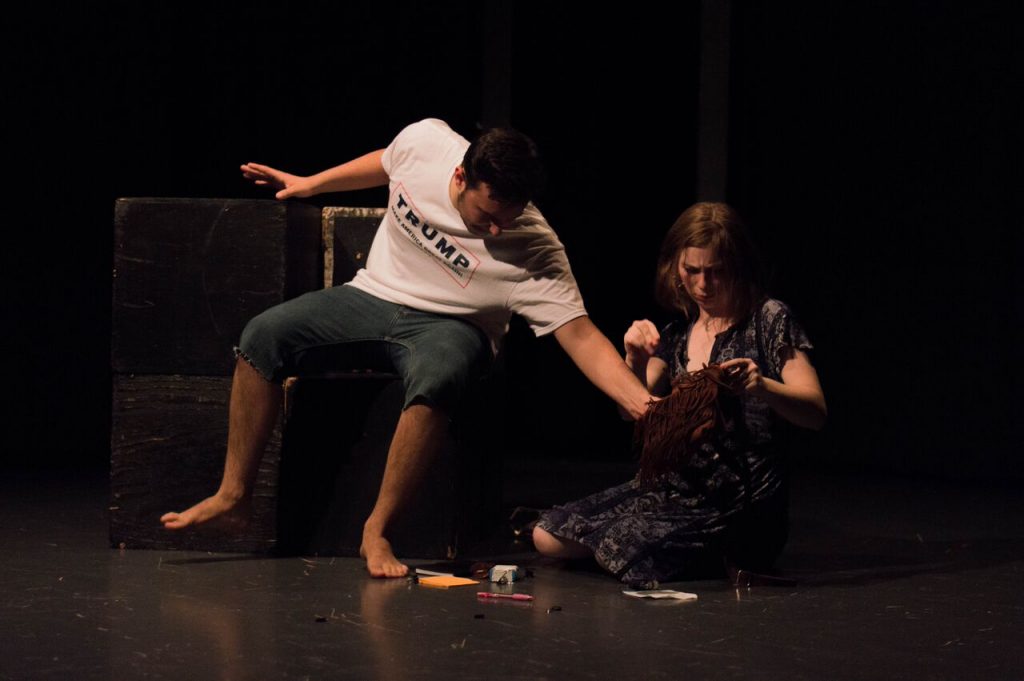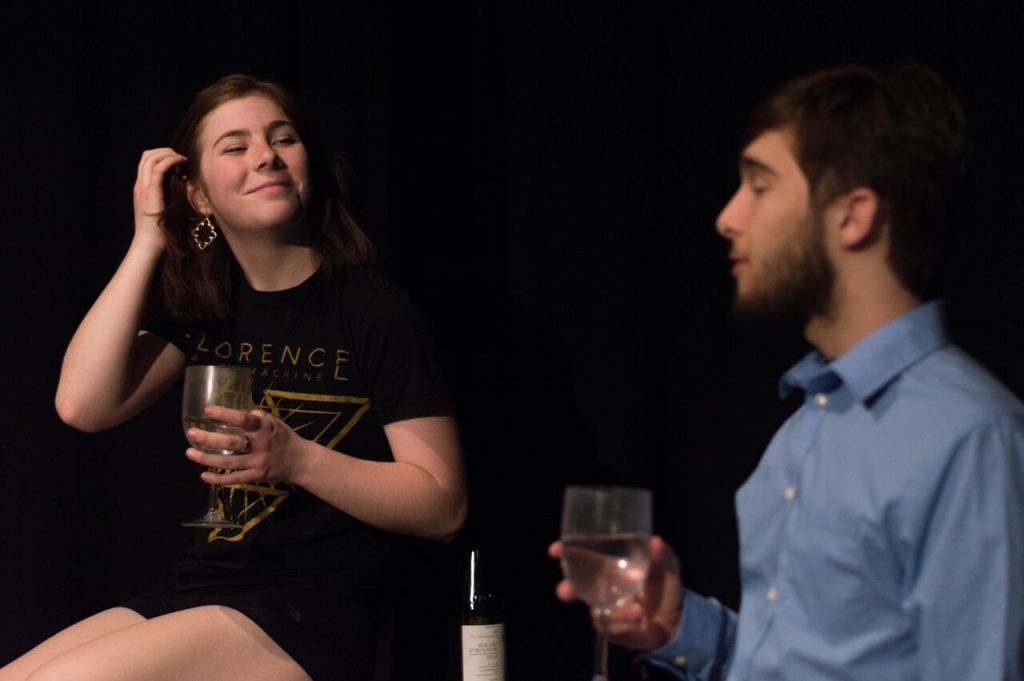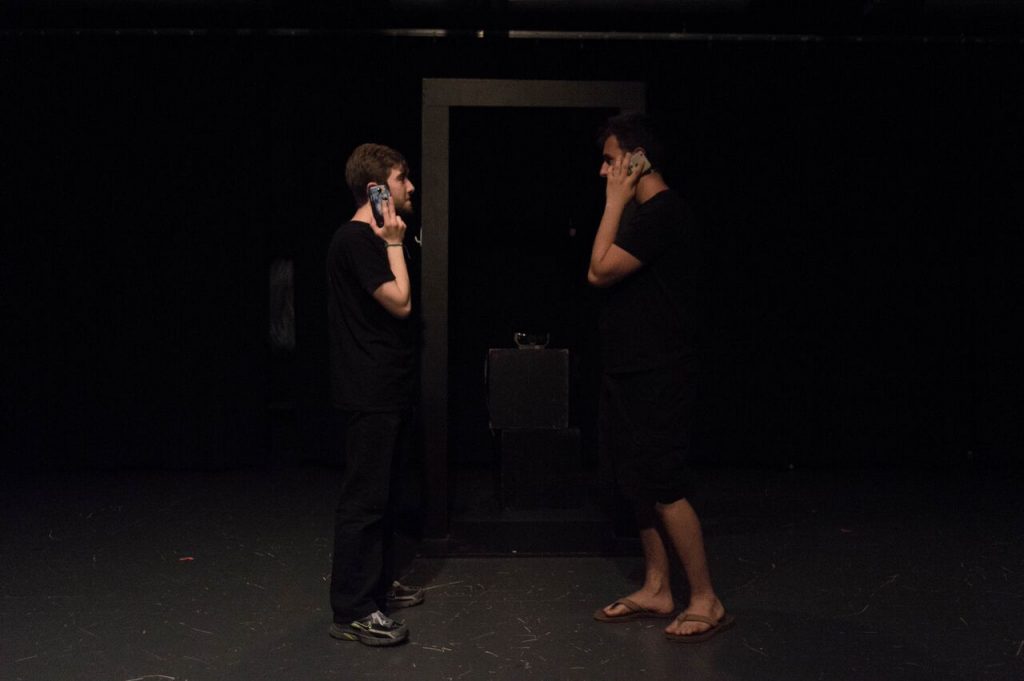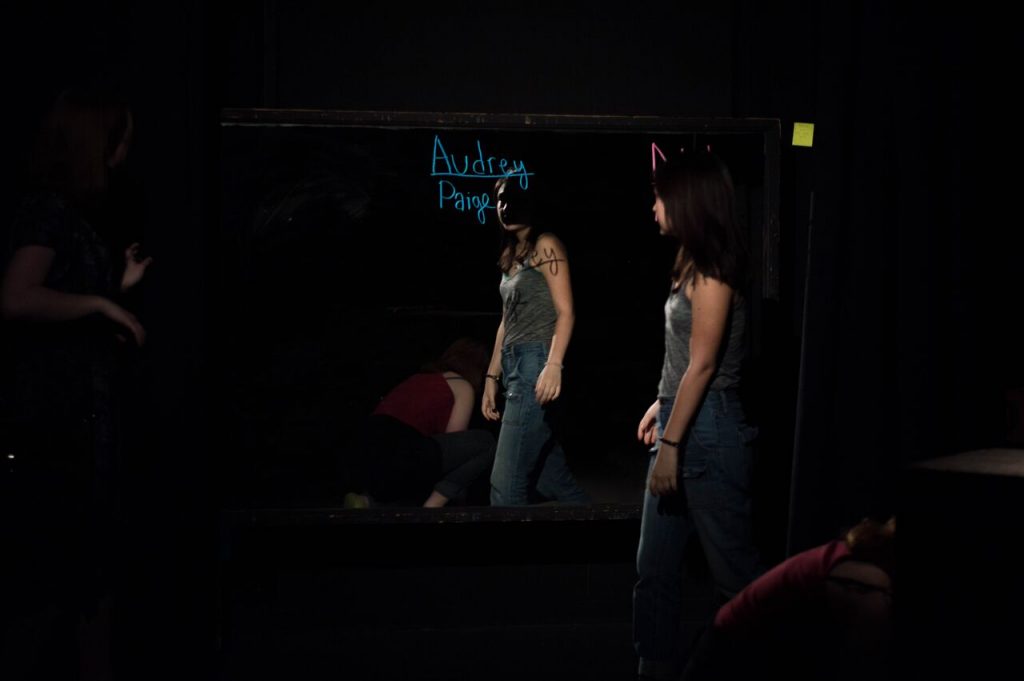By Zoe Lesser
“Ultimately, we are looking to tell four distinct truths—a task difficult enough to achieve with just one story. Yet, we also acknowledge that we cannot mask our theatrical setting, nor will we try to—we will only reveal it further.”

Nick Ranieri ’20 and Audrey Erickson ’20 in The Levee by Taylor Marc Bowyer. Photo by Dante Haughton ’19.
Director Nina Slowinski ’19 prefaces Four Ten Minute Plays with this excerpt in the program. She recognizes the difficulty of telling stories that confront the world’s truths but resolves herself to tackling it anyway, using the honesty and theatricality of a stage. In JKB’s own Studio A, four short 10-minute plays are brought to life by three talented actors: Taylor Mac Bowyer’s The Levee, Neil LaBute’s A Second of Pleasure, Amy Herzog’s 508, and John Lipkin’s The Date. By putting everyday, seemingly insignificant moments on a stage, it focuses on the truth of them: the pain, uncertainty, and vulnerability of romantic relationships.
The stage is set with just a few black boxes and a doorframe. None of the furniture indicates time, place, or purpose—this is left to the characters in the worlds of each play to determine. Juxtaposing this dark, minimalist, set are four distinctly colored lights illuminating the room. They give the room a feeling of tranquility and optimism. As the show begins the lights fade on Nick Ranieri ’20 wearing a Trump shirt and sauntering around what he indicates to be a kitchen. Audrey Erickson ’20 appears through the doorway, intoxicated, and the two of them cope with their fears of financial stability, pregnancy, and purpose. “There’s nothing here, just leftover dust. Used to grow things, doesn’t have a purpose anymore” Erickson’s character says. The couple has reached a point where none of their dreams have come to fruition and they remain stagnant in their state of uncertainty.

Audrey Erickson ’20 glances over at scene partner Philip Merrick ’19 in 508 by Amy Herzog. Photo by Dante Haughton ’19.
As a blackout ensues, the characters openly transition to the next play in front of the audience. On the left side we see a mirror with a column for each actor, as they write down the role of the next character they are about to play. The middle section is covered in post-it notes with a color scheme that matches the color of the lights. On the right is a dressing rack where the actors change. We see the actors transform completely, breaking our suspension of disbelief. We become very aware that we are watching a performance and in that, aware that the actors are exposing the theatricality of relationships.
The lights come back up on Philip Merrick ’19 sitting on a new configuration of black blocks. This time, they represent a bench in a train station. Suitcase in hand, he talks to Erickson as her character admits that she cannot commit to this train trip with him. On the other side of the stage is Ranieri, echoing Merrick’s lines. He plays Erickson’s husband: a sloppy, over-bearing, man, eating cereal in a blazer, loosened tie, and pajama pants. We see Erickson realize that she cannot continue her affair with this man who appears to be patient, sensitive, and understanding. The play culminates with Erickson’s character returning to her abusive, unresponsive, husband.
Following a similar transition to the previous one, we see a broken up couple returning each other’s belongings a year later. Merrick’s character is married now, yet Erickson’s character beckons for him to stay and talk for a bit longer. “Life is easier when you make the right decisions” Merrick says, justifying his decision to leave this past relationship and move on.

Nick Ranieri ’20 and Philip Merrick ’19 in The Date by Joan Lipkin. Photo by Dante Haughton ’19.
The last play features two men at the beginnings of a possible relationship. Neither of them knows exactly what they want. Ranieri’s character battles with internalized homophobia as he tries to express his feelings to Merrick’s character. Merrick plays a character struggling to navigate this almost-relationship, in spite of the fact that he is HIV positive. The two of them grapple with their fears and concerns while courting each other, bringing them closer together.
Relationships inherently bring uncertainty. These four plays display sets of people navigating their uncertainty, offering glimpses of extremely human moments. These plays do not offer any concrete answers to life’s challenges but instead provide a glimpse into the lives a specific set of individuals.

Director Nina Slowinski ’19 looks over part of her set pre-show. Photo by Dante Haughton ’19.
PHOTO GALLERY
PRODUCTION CREDITS
Directed by: Nina Slowinski ’19
Stage Manager/Light Design/Sound Design: Miranda Coble ’19
Ensemble: Nick Ranieri ’20, Audrey Erickson ’20, Philip Merrick ’19
***
Zoe Lesser is a sophomore Theater//English major and a staff writer for the Living Newsletter










